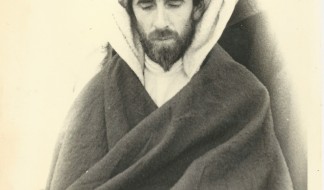
Shaykh Dr. Abdalqadir As-Sufi al-Murabit (1930-)
Ian Dallas (now Shaykh Dr. Abdalqadir as-Sufi) came to Berkeley in 1970 to meet me a…
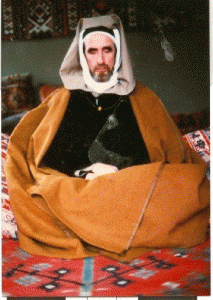 Ian Dallas (now Shaykh Dr. Abdalqadir as-Sufi) came to Berkeley in 1970 to meet me and see if The Floating Lotus Magic Opera Company would collaborate on a movie project by the director of the Woodstock film, having read a Rolling Stone article about us that peaked his interest (it mistakenly attributed one of our influences as Gurdjief), and having been made a deputy of the Moroccan Shaykh Muhammad ibn al-Habib (raheemahullah), with already a small group of remarkable Muslim Sufi souls formed in London.
Ian Dallas (now Shaykh Dr. Abdalqadir as-Sufi) came to Berkeley in 1970 to meet me and see if The Floating Lotus Magic Opera Company would collaborate on a movie project by the director of the Woodstock film, having read a Rolling Stone article about us that peaked his interest (it mistakenly attributed one of our influences as Gurdjief), and having been made a deputy of the Moroccan Shaykh Muhammad ibn al-Habib (raheemahullah), with already a small group of remarkable Muslim Sufi souls formed in London.
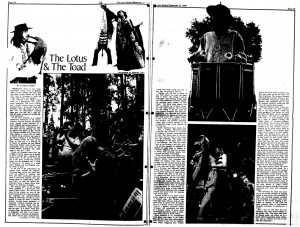 A Gustave Doré/Don Quixote-like Scottish aristocrat in appearance, tall, lean and electric, radical intellectual, renowned playwright and BBC TV adaptor and 60s visionary, who met the great scholar-shaykh and arifbillah (Sufi gnostic) in Morocco, Shaykh Muhammad ibn al-Habib (raheemahullah), as recorded in his “novel” from that period, The Book of Strangers, Ian Dallas arrived on the doorstep ready to take us on a windy ride, insha’Allah, a torrential and ofttimes downright hurricanic ride. And the windmills he tilted at were himself and us. But first and foremost, he took us to the presence of the great Qutb shaykh, Muhammad ibn al-Habib (raheemahullah), who it was said was over a hundred years old in 1970, and disciples of his who had been with him for decades, including their children and grandchildren. The zawiyya there rang with light.
A Gustave Doré/Don Quixote-like Scottish aristocrat in appearance, tall, lean and electric, radical intellectual, renowned playwright and BBC TV adaptor and 60s visionary, who met the great scholar-shaykh and arifbillah (Sufi gnostic) in Morocco, Shaykh Muhammad ibn al-Habib (raheemahullah), as recorded in his “novel” from that period, The Book of Strangers, Ian Dallas arrived on the doorstep ready to take us on a windy ride, insha’Allah, a torrential and ofttimes downright hurricanic ride. And the windmills he tilted at were himself and us. But first and foremost, he took us to the presence of the great Qutb shaykh, Muhammad ibn al-Habib (raheemahullah), who it was said was over a hundred years old in 1970, and disciples of his who had been with him for decades, including their children and grandchildren. The zawiyya there rang with light.
For years he was our interpreter in labyrinthine literary English of the Qadiri-Shadili-Darqawi-Habibiyya teachings, and always instilled in us a profound love and reverence for the Prophet Muhammad (salallahu allayhi wa salaam). But his methods were radical, his rapier wit and expertise at a kind of wholesale personality deconstruction, with a City on the Hill (or better, Medina) vision in the near distance, were often seemingly arbitrary in their administration. Abdalqadir loved to put us in a species of spiritual jeopardy, a litmus crossroads for faith, to be out where real reliance on Allah was required. For that he had, as he put it, “freedom in desiring and acting,” earmarks of a sure shaykh, with the traditional anecdotes and writings of Sufi shaykhs that inspired him backing him up. A story he loved: A shaykh told his disciple to jump out the window. He did. The shaykh went down to where he’d landed, most of the man’s bones broken, and told him to get up. He did. Now, some might have taken this as a clue to definitively sever from Shaykh Abdalqadir once and for all. For others it only confirmed our determination to remain.
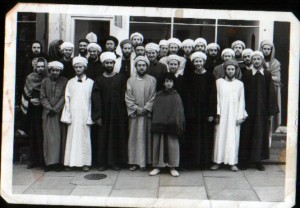
What was the magnetism? I’ve never been so enthralled by discourses, and wondered from what depths such knowledges bubble up. He was door and preceptor for me and so many others to enter the enlightenment of Islam. Those with bitter experiences may have another perspective, with good reason, but Allah knows best. He in his restless and peripatetic career has built and founded mosques around the world (even among the Lacandón Indians of Chiapas, Mexico!), had the Qur’an translated into English and Spanish, the Muwatta of Imam Malik, the Shifa of Qadi Ayad, and written countless books which have brought people to embrace Islam. And for this we can always thank the Divine Host, Allah, Who alone knows whose service is most true.
(An added note: His economic predictions and seeming obsessive warnings about the Euro currency over forty years ago have been borne out by today’s financial crises, 2015.)
And one of his most faithful of those companion-devotees is Shaykh Abdalhaqq Bewley, who also accompanied Abdalqadir in the earliest days of the search and discovery of Shaykh ibn al-Habib, raheemahullah, living in the zawiyya in Meknes with the shaykh and his fuqara, and learning from them, in Arabic, directly. He and his wife, renowned translator Aisha Tarjumana, made the Qur’an version in English under the shaykh’s supervision. With a quiet resonance and reverberation, Shaykh Abdalhaqq serves the tariqa with his own self-effacing light.
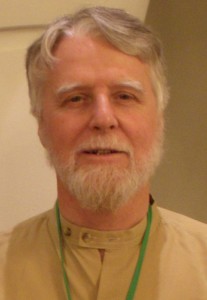
See Wikipedia citation for Shaykh Dr. Abdalqadir as-Sufi
(photos of Shaykh Abdalqadir and group photo of fuqara © Peter Sanders)
Categories: The Floating Lotus Magic Opera Company, Spiritual Teachers